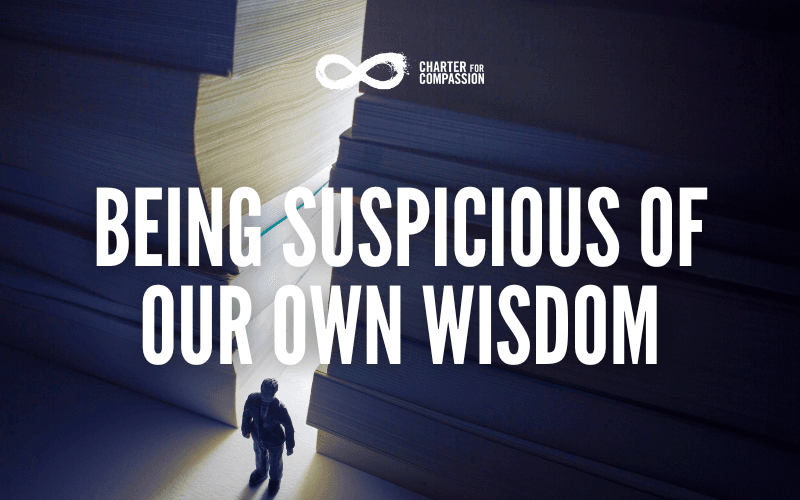
We all have our opinions. They are usually based on assumptions, previous experiences and ideas passed onto us by others. In our fast-paced world, where information is at our fingertips and opinions are formed in an instant, we often find ourselves jumping to conclusions, convinced that we know the answer.
But how often do we stop to question the wisdom behind those conclusions?
How often do we challenge our own assumptions, biases, and beliefs before we speak or act?
The truth is our perceived wisdom can sometimes lead us astray. We might believe we understand a situation, a person, or an issue fully, only to discover later that we were mistaken. The consequences of these mistaken beliefs can be significant—relationships can be damaged, opportunities missed, and, most importantly, we can cause harm that’s difficult to undo. I'd like to explore with you the necessity of questioning our own wisdom, and how transforming statements into questions can lead to more thoughtful, constructive conversations.
Years ago in my teaching days, I had a senior colleague, Seymour Fersh, who was an expert in cross-cultural communication. In one of his books, Learning about Peoples and Culture, he addressed the semantics and study of culture. He presented a number of ideas we have in communicating with others. He warned that "dictionaries carry definitions, people carry connotations—and it is connotations that influence thinking and rule behavior."
He offered some suggestions to improve the way in which we communicate. One suggestion he offered was to be suspicious of our own wisdom. I've been thinking about this concept, especially as we are living in a highly vulnerable environment.

Here are some lessons I believe are worth sharing:
Pause Before You Speak or Act: The first step in challenging our own wisdom is to pause. In moments of strong emotion—whether it's certainty, anger, or enthusiasm—take a moment to breathe and consider whether you truly have all the facts. This simple pause can prevent hasty decisions and statements that may later need to be retracted.
Turn Statements into Questions: Instead of declaring, "I know this is the right way," ask yourself, "Why do I believe this is the right way? What am I missing?" By framing your thoughts as questions, you open the door to exploration and understanding rather than closing it with a definitive statement. Questions invite curiosity, dialogue, and deeper insight.
Seek Diverse Perspectives: One of the most effective ways to challenge your wisdom is to seek out perspectives that differ from your own. Engage with people who see the world differently and listen to their viewpoints with an open mind. This doesn’t mean you have to agree with everything you hear, but it does mean valuing the insights that others bring to the table.
Reflect on Past Experiences: Consider moments when you were sure you were right but later realized you were mistaken. What led you to that certainty? What could you have done differently? Reflecting on past experiences can provide valuable lessons in humility and the importance of questioning our own wisdom.
The Power of Turning Statements into Questions
When we shift from making statements to asking questions, we move from a position of authority to one of inquiry. This change can transform how we interact with others:
- Statements Can Close Doors; Questions Can Open Them: A definitive statement can shut down conversation, signaling that the matter is settled. A question, on the other hand, invites others to share their thoughts and engage in dialogue.
- Questions Foster Collaboration: By asking questions, we acknowledge that we don’t have all the answers and that others’ input is valuable. This can lead to more collaborative and constructive conversations.
- Questions Promote Reflection: When we ask questions, we encourage not only others but also ourselves to think more deeply. This reflection can lead to greater understanding and more thoughtful responses.
The Difficulty of Taking Back Harmful Statements
Once words are spoken, they cannot be unspoken. The damage caused by a thoughtless or hurtful statement can linger, affecting relationships and trust. This is why it's so important to challenge our wisdom before we speak:
- Words Have Power: A single statement can harm, alienate, or mislead. Recognizing this power is the first step toward more responsible communication.
- Apologies Are Not Always Enough: While apologies are important, they don’t always undo the harm caused by hurtful words. The best way to avoid this harm is by thinking carefully before speaking.
- Constructive Conversations Require Careful Language: Engaging in meaningful, productive dialogue requires us to choose our words carefully, ensuring they build bridges rather than walls.
Engaging in Constructive Conversations
To truly engage people in constructive conversations, we must embrace humility, curiosity, and empathy:
- Listen More Than You Speak: In any conversation, especially challenging ones, prioritize listening over speaking. This allows you to fully understand the other person’s perspective before responding.
- Practice Empathy: Try to see the world through the other person’s eyes. How might they be feeling? What experiences are shaping their views? Empathy can transform a conversation from adversarial to collaborative. I'm reminded of George Orwell's statement: "We have two ears, two eyes and one mouth and we should use them accordingly."
- Ask Open-Ended Questions: Encourage dialogue by asking questions that require more than a yes or no answer. Open-ended questions allow for deeper exploration of ideas and feelings.
- Acknowledge When You Don’t Know: It’s okay to admit when you don’t have all the answers. In fact, this humility can foster a more open and honest conversation.
Conclusion: The Ongoing Journey of Wisdom
Exploring our own wisdom is not a one-time task but an ongoing journey. It requires continuous reflection, questioning, and learning. By challenging our assumptions, turning statements into questions, and engaging in thoughtful conversations, we can avoid the pitfalls of premature conclusions and create a more compassionate, understanding world.
Let us commit to this journey of wisdom, knowing that in doing so, we not only become wiser ourselves but also contribute to the collective wisdom of our communities. After all, the path to true understanding is paved not with declarations but with questions, curiosity, and a willingness to learn.
With warm regards,
Marilyn


